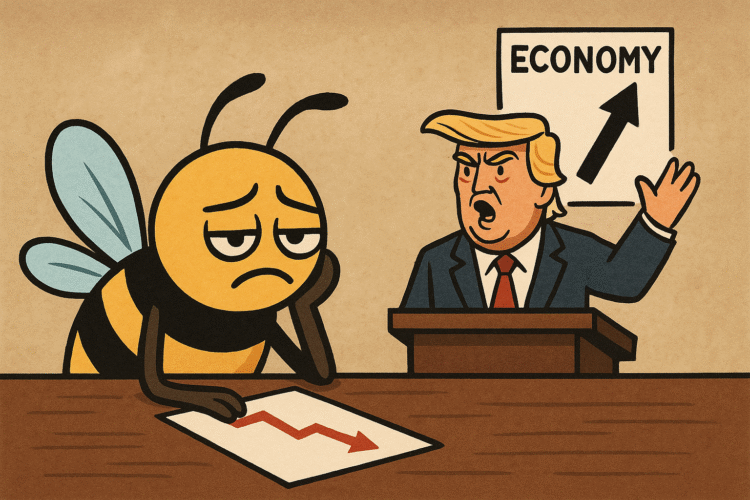
It’s another day in America, and the President has once again reminded us that numbers are not to be trusted. Not his numbers, of course—those are gold-plated, patriotic, and possibly blessed by the ghost of Reagan—but other people’s numbers. Specifically, the ones from the Bureau of Labor Statistics that dared to suggest inflation is rising and job growth is slowing.
According to the President, this isn’t reality—it’s sabotage.
A “political hit job.”
A deep-state Excel spreadsheet uprising.
The equivalent of your bathroom scale telling you you’ve gained weight and deciding the scale must be liberal.
To hear him tell it, the American economy is not just good—it’s the best economy in the history of the galaxy. Possibly the multiverse. If aliens are unemployed on Mars, that’s because they didn’t have the foresight to elect him.
And sure, eggs cost $8, rent is a four-figure hostage situation, and your paycheck stretches about as far as a CVS receipt in a hurricane—but that’s your perception problem. In the official presidential reality, everything is thriving. The economy is strong. Your wallet is heavy. And if it isn’t, you’re probably a Democrat.
The Bureau of Labor Statistics, of course, is Public Enemy Number One this week.
It’s not that they’ve changed their methodology.
It’s not that they’ve cooked the books.
It’s that they’ve reported numbers that contradict the Official Vibe.
And in Trump’s America, the vibe is the metric.
It doesn’t matter if your grocery bill now reads like a car payment—if the President says the economy is perfect, then you’re supposed to nod, smile, and quietly Venmo your landlord the rest of your dignity.
The beauty of this logic is its adaptability.
If job growth is good? “Look at what I did!”
If job growth is bad? “The deep state is lying!”
If inflation slows? “My policies are working!”
If inflation rises? “Fake news! These numbers are rigged!”
It’s the Schrödinger’s Cat of economic policy: the data both proves and disproves the President’s greatness, depending entirely on which Fox News chyron is currently on-screen.
And we, the public, are left playing the worst drinking game in history—taking a shot every time “political bias” is blamed for something we can actually see with our own eyes.
Egg prices.
Gas prices.
Housing costs that make you wonder if you should just live in your car and rent your apartment out to an influencer.
All of it, apparently, is a conspiracy. Because to admit the economy has problems would mean admitting the President is mortal. And that’s simply not the brand.
This is where the satire gets sticky, because the truth is, we’re used to it.
We’ve been trained for years to pick our own truth buffet-style. Inflation? You can choose the “rigged statistics” entrée or the “strongest economy ever” dessert. It all depends on which table you’re sitting at.
And in that environment, the Bureau of Labor Statistics is like the awkward sober friend at the party—bringing receipts, citing facts, and killing the vibe.
The irony is, the President’s version of the economy isn’t even a lie in the traditional sense. It’s marketing. It’s rebranding the numbers until they’re less about math and more about mood.
It’s not “2% GDP growth.”
It’s “The Best GDP Growth in Recorded Human History, If You Only Count the Years I Was in Office and Ignore Certain Quarters.”
It’s not “unemployment rose by 0.3%.”
It’s “Everybody Has a Job, Unless You’re Lazy or a Democrat.”
It’s the same logic as declaring your McDonald’s fries to be the healthiest meal in America because technically they’re made from vegetables.
And here’s the wild part: it works.
Not for everyone, of course—but for enough people that the gap between what’s happening and what’s believed becomes the size of the actual GDP.
Because in politics, perception is reality.
If enough people believe the economy is strong, they’ll keep buying, keep voting, keep insisting that $8 eggs taste better.
The President isn’t managing the economy—he’s managing the story about the economy. And in 2025, that’s almost the same thing.
Final Thought:
The trouble with turning facts into feelings is that eventually the bill comes due.
The rent hike still hits. The paycheck still falls short. The grocery cart still costs more than the gas in your car.
Numbers may be easy to discredit in a speech, but they have a nasty habit of showing up in your bank account. And when they do, no amount of “fake news” branding will make them disappear.
Unless, of course, the Bureau of Labor Statistics starts issuing vibes instead of reports. Then we might just have the strongest economy in the history of the world—forever.